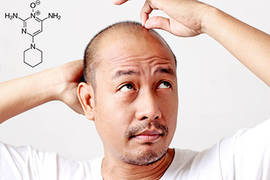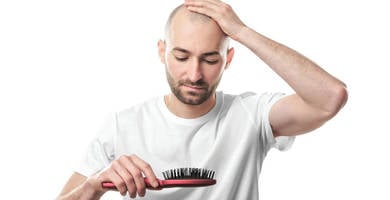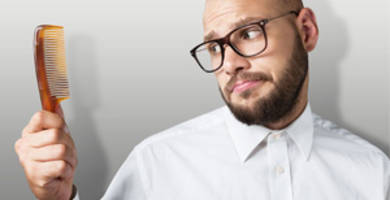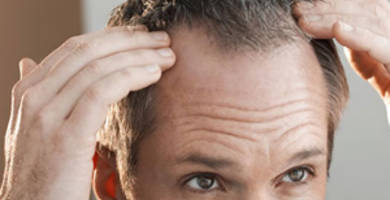What causes excessive sweating of the head and face?
By Prof. Dr. Soner Tatlidede 2021-12-27
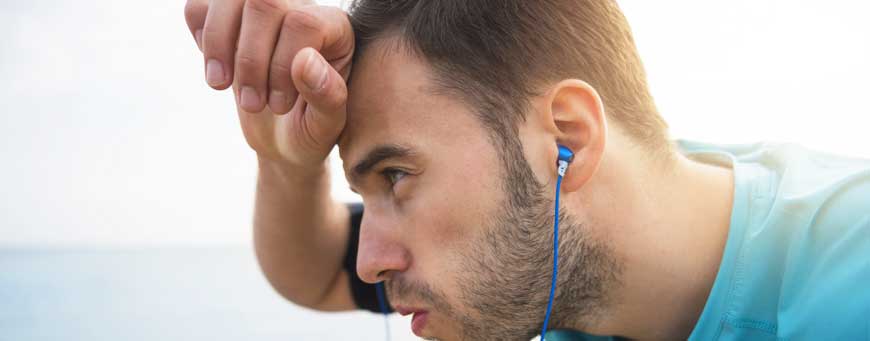
What causes excessive sweating of the head and face? Many people suffer from an unexplained sweating on head, face or other areas of the body: a condition that is known as hyperhidrosis, making you sweat abnormally. Sweating is a natural process, a bio mechanism that our body uses to eliminate excess of temperature and to protect itself from germs; but people with hyperhidrosis sweat excessively, even if there is no hight temperature.
We at Clinicana are specialists in all hair treatments, and thanks to the good reviews of our patients and our reputation, we receive all kinds of enquiries; precisely, some of them come from people with hyperdrosis asking questions such as “Why do I sweat so easily on my head?”, “How can I stop sweating through my head?”, etc: not only because of the discomfort and embarrassment that this condition generates, but also because it causes damage to hair. So, let's talk about what causes heavy head sweats... and how to avoid it.
Excessive sweating head: is it normal?
I sweat a lot from my head: is that normal? Should I worry about sweating too much on face and head? As we have just explained before, sweating is something perfectly normal, and in fact we need to regulate our body temperature through sweat. However, the problem comes when we sweat excessively - to the point of dripping, and even soaking our clothes - without a clear and predictable cause: this is called hyperhidrosis, a condition suffered by 3% of the population, although most of people with these symptoms never go to a doctor.
Normally, hyperhidrosis is not general, but located in certain areas of the body: feet, hands, armpits... When the problem comes from a sudden sweating from the head area (including all or some of these areas: forehead, face, scalp, neck...), then we call it craniofacial hyperhidrosis.
This type of hyperhidrosis is especially visible since it can affect our head and our face; so, it affects in a more psychologically way to people, who can develop complications when interacting with others or showing themselves in public; in addition, craniofacial hyperhidrosis has consequences for hair. Therefore, if you wonder "Why does my head sweat so much in the heat?"... Maybe you are suffering from hyperhidrosis, and should consult a doctor.
Why do I sweat so much from my head?
OK, now we know what craniofacial hyperhidrosis is; but what causes head and neck sweats? Well, the causes of excessive sweating in the head and neck, or why hyperhidrosis occurs in different areas of the body, are not clear. Actually, the reasons behind severe sweating can be different, including:
- stressful situations
- physical efforts (even during a short time)
- high temperatures
- there are some medications that cause excessive head sweating
- menopause causes head sweats, too
- certain diseases (hyperthyroidism, Parkinson's disease, cancer...)
Stress, doing exercise, or heat, can cause sweating in many people; the difference is that people with hyperhidrosis sweat much more: they can sweat abnormally and excessively even at rest, or when it is not hot. It is not a very common disorder, but severe head sweating caused by hyperhidrosis is one of the most difficult to treat.
What happens in people with hyperhidrosis is that the nerves that send signals to the sweat glands in the skin are over-active, and become activated much more frequently than normal, even if it is not necessary to regulate temperature. This is the most common type of hyperhidrosis, and is called primary or essential: there are studies that suggest that it could be inherited. Besides, excess of sweating can cause stress in patient, which feeds back the process and increases sweating even more.
When hyperhidrosis is the consequence of a disease, then it is called secondary: this is less common, and when it manifests it usually appears throughout the body, and not in specific areas as occurs with the primary type.
Consequences for hair of too much sweating in head
Although the sweat - made up of 90% water - that appears on the head is usually odourless, excess of sweating affects not only our personal image, but also the scalp, causing hair to dry out due to sweat salt.
In addition, sweat accumulation can affect follicles function, causing hair to become weak and brittle, and making new hair to grow with less strength, thinner, and dull.
How to stop head sweating
Once we have identified the problem, the next question is clear: how do I stop my head from sweating so much? How can I avoid the worst consequences of hyperhidrosis? Let's take a look at some tips about excessive sweating face and head treatment.
Keep your hair clean and healthy:
To avoid the consequences on scalp and follicles of sweating trough your head too much, it is necessary to keep a regular daily hair care, washing it daily and using a special shampoo to stop head sweating. This is one of the best home remedies for excessive sweating on face and head, because in this way, we eliminate the salt and grease accumulated by sweat - which can clog hair follicles – and, besides, we prevent the development of bacteria, which can harm our scalp health.
Take care of your diet:
Although genetics probably plays an important role in hyperhidrosis, sometimes behind excessive sweating there is a problem related to a poor diet or inadequate nutritional factors. Inadequate food can trigger sweat, that’s why some people experience head sweating after eating. Hence, there are certain eating habits that can help reduce sweating:
- Avoid eating your meal when it´s still very hot
- Do not eat spicy foods
- Reduce fat in your diet
- Reduce consumption of coffee, tea and other beverages with caffeine or theine
- Avoid carbonated and high-calorie drinks (sodas)
- Increase in your diet fruit, vegetables and blue fish consumption
- Avoid drinking alcohol
Drink cold water:
When we sweat, our body is trying to regulate its temperature by eliminating excess of heat through sweat; so, one way to help reduce sweating is to drink cold beverages frequently, preferably water. By doing so, we are not going to completely eliminate sweat; but if every time we feel some heat or start to sweat, we drink cold water, we will help to alleviate the symptoms and reduce sweating.
Ask your doctor about the use of botulinum toxin:
There are multiple studies that seem to corroborate that using botulinum toxin (Botox) is very helpful for head and facial sweating treatment; this is because Botox blocks the acetylcholine neurotransmitter, which triggers sweating. However, any treatment of this type should be previously consulted with a doctor and performed by an expert, since it is only recommended in extreme cases in which other treatments do not work. Your doctor will inform about the Botox for head sweating cost, which usually is around $1,000 per session.
Use medication (with prescription):
Before resorting to Botox, you can take some medications used to treat excess sweating. For hyperhidrosis, anticholinergics are commonly used: these are drugs that block acetylcholine, and are taken orally in the form of capsules. They have an effect for a limited time, and should always be prescribed by a specialist who values whether they are suitable for your condition, since they can also have mild side effects (dry mouth, blurred vision, etc.).
Now that you know what causes excessive sweating of the head and face, if you have symptoms related to craniofacial hyperhidrosis it is important to consult an expert as soon as possible, so that your problem can be diagnosed in time to avoid further damage to your hair, and make a hair transplant unavoidable. Clinicana is the best hair transplant clinic in Turkey and we are specialists in all hair treatments. Request a free consultation, and ask us for a free, no obligation estimate for your treatment.

